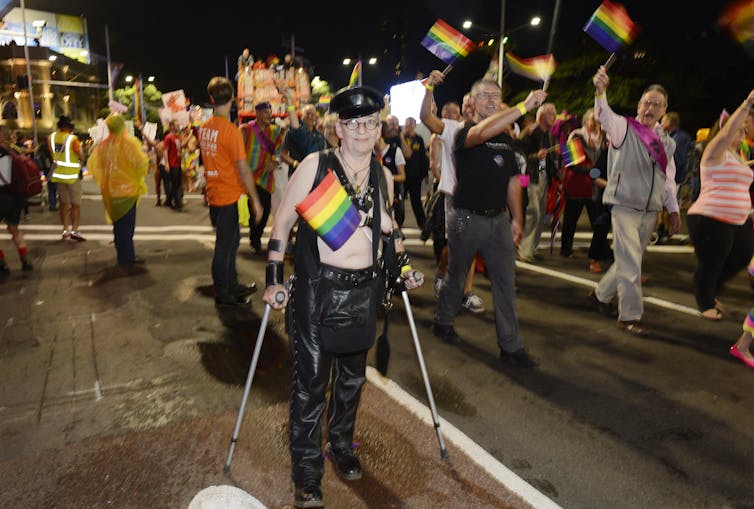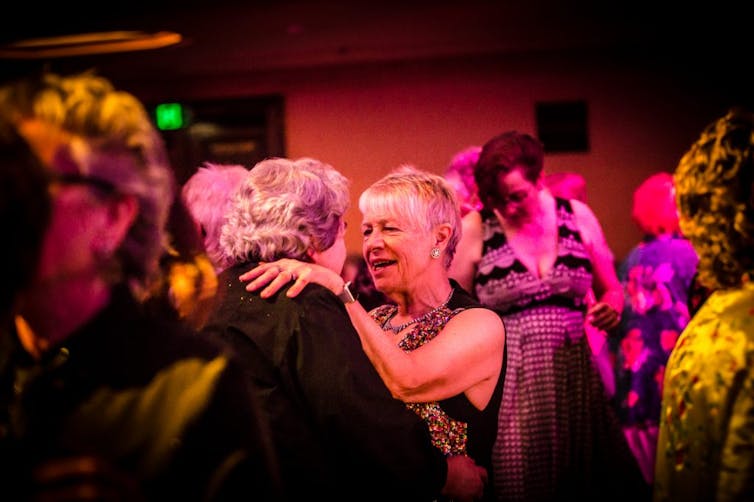World Pride has come to Sydney, with the annual Mardi Gras Parade on Saturday having returned to its Oxford Street home for the first time in three years.
The 17-day festival is expected to host 500,000 participants over more than 300 events. It is an opportunity to celebrate all things queer, and a good time to take stock of the changes LGBTQ+ older people have experienced, and the challenges they continue to face.
LGBTQ+ people aged in their 70s, 80s and 90s have witnessed extraordinary social change regarding gender and sexual diversity. For example, in Australia, same-sex marriage is now legal, Gender Identity Disorder has been removed as a clinical diagnosis, and all states have an equal age of consent for homosexual and heterosexual sex.
These have been hard-fought gains after many years of adversity and advocacy on the part of LGBTQ+ older people, among others.
Each year, the 78ers – who were involved in the Sydney marches and protests between June and August 1978 – take pride of place towards the front of the parade.

Loneliness and social isolation
Despite these achievements, the consequences of living most of one’s life in a homophobic and transphobic society have been considerable, particularly in terms of mental illness and social isolation.
Australian and US research indicates loneliness is more common among lesbian, gay and bisexual older people than the general population. This is particularly so for those who live alone and are not in a relationship. Similar findings are reported in relation to transgender older people, although more research is needed.
Loneliness is also more common among lesbian and gay older people who are disconnected from LGBTQ+ communities and who hold negative attitudes towards their own same-sex attraction.
For LGBTQ+ older people experiencing social isolation and loneliness, what might be their experience of watching World Pride from a distance? What might it be like navigating rainbow paraphernalia while shopping at Coles (a World Pride partner)? How might they perceive the glitz and glamour of the Mardi Gras Parade?
World Pride may be challenging for those who don’t feel an attachment to LGBTQ+ communities or who feel negative about their own sexuality. And this may reinforce a sense of disconnection.
But some may gain comfort from witnessing the sense of community on display. It may even strengthen their perceived connection to other LGBTQ+ people. And, for those who are not open about their sexuality or authentic gender, it may support their journey to “come out” later in life.
Read more: Blessed Union puts queer families centre stage, with hilarity and heartbreak
The impact of discrimination
For many LGBTQ+ older people, the experience of discrimination remains very real in their lives. Past and recent discrimination leads to delays seeking treatment and support, simply because people expect to be discriminated against when accessing services.
In Australia, previous discrimination has been found to predict loneliness and lower mental health among older lesbian and gay people. In the US, microaggressions – small everyday interactions that reinforce the experience of being “other” – have predicted greater impairment, higher rates of depression and lower quality of life among LGBTQ+ people aged 80 and over.
There remain major gaps in evidence on the issues faced by LGBTQ+ older people, particularly for bisexual, queer, transgender and nonbinary older people. This is mainly due to the failure to systematically collect inclusive data on gender and sexual diversity, through variables such as those recommended by the Australian Bureau of Statistics.
Strengths and resilience
This year, older people seemed to occupy a more prominent place in the Mardi Gras Parade. Perhaps this is because of the natural ageing of our community activists. Older people were also represented in the wider World Pride festival, such as in the theatre production All the Sex I’ve Ever Had, in which older Sydney residents reflect on the evolution of their sexuality over the course of their lives.

A festival like World Pride showcases the strengths and resilience of LGBTQ+ people and communities. The organisation of such an event should not be underestimated. This reflects LGBTQ+ people’s high level of civic engagement and commitment to giving back to society, as demonstrated by their greater likelihood of being volunteers and caregivers. And the contribution of volunteers and caregivers during the HIV/AIDS crisis of the 1980s and ‘90s is not forgotten.
LGBTQ+ older people generally are resilient and maintain good health. Many report increased confidence and self-esteem, compared with when they were younger. And many have created their own families – their families of choice – to support each other in later life.
But we don’t know enough about their needs and how to provide them with inclusive services as they get older. World Pride is an opportunity to reflect on the hard-won gains but not ignore the challenges ahead.
"original" - Google News
February 28, 2023 at 02:15AM
https://ift.tt/25JKnV4
For some LGBTQ+ older people, events like World Pride can be isolating – we need to better understand how to support them - theconversation.com
"original" - Google News
https://ift.tt/5scjN1D
https://ift.tt/IbleZxX
Bagikan Berita Ini














0 Response to "For some LGBTQ+ older people, events like World Pride can be isolating – we need to better understand how to support them - theconversation.com"
Post a Comment